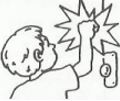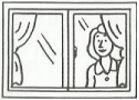
No washing
 المؤلف:
L.A Hill
المؤلف:
L.A Hill
 المصدر:
Elementary Anecdotes In American English
المصدر:
Elementary Anecdotes In American English
 الجزء والصفحة:
48-1
الجزء والصفحة:
48-1
 6/10/2022
6/10/2022
 947
947

Mr. and Mrs. Gray live in a big city, and they have a son. His name is Pete, and he does not like to wash. One day Mrs. Gray said to her husband, "Living in the city all the time isn't good for Pete." So last summer they found a small house in the country and took Pete there for a vacation.
When they arrived at the house, Mrs. Gray said to Pete, "We're going to stay here for two weeks."
The boy ran into the house and looked in all the rooms, and then he ran back to his mother and said to her, “I haven't found the bathtub, Mom. Where is it?"
"This is a very small house, Pete," his mother said, "and there is no bathtub." "That's very good," Pete said. "This is going to be a very nice vacation."
A Answer these questions:
- Why did Pete's parents take him to the country?
- Where did they stay in the country?
- What did Pete ask his mother when he got there?
- What did she answer?
- Was Pete happy?
- Why?
B Which of these sentences are true? Write down the correct ones.
- Pete lives in the country.
- Pete's father said, "Living in the city isn't good for Pete."
- His parents took him to the country for a vacation.
- They wanted to spend two weeks there.
- Pete tried to find the bathtub.
- There was a very small bathtub in the house.
- Pete was happy because he did not like to wash.
- Pete was happy because he liked to wash.
C Write this story using words instead of pictures.
In front of Pete’s  in the
in the  , there was a lot of
, there was a lot of  Pete loved
Pete loved  it. When he finished cutting the grass at his house, Pete went to his neighbor’s house and
it. When he finished cutting the grass at his house, Pete went to his neighbor’s house and  on the door. Pete’s mother watched through the
on the door. Pete’s mother watched through the  . Pete
. Pete  to the neighbor, and then came back. Pete was
to the neighbor, and then came back. Pete was  . His mother asked, “What did you say to our neighbor?”
. His mother asked, “What did you say to our neighbor?”
Pete answered, “I said, ‘Can I cut your grass, too?’ But then he asked, ‘How much?’ and I didn’t have any  0 to give him.”
0 to give him.”
 الاكثر قراءة في Elementary
الاكثر قراءة في Elementary
 اخر الاخبار
اخر الاخبار
اخبار العتبة العباسية المقدسة


